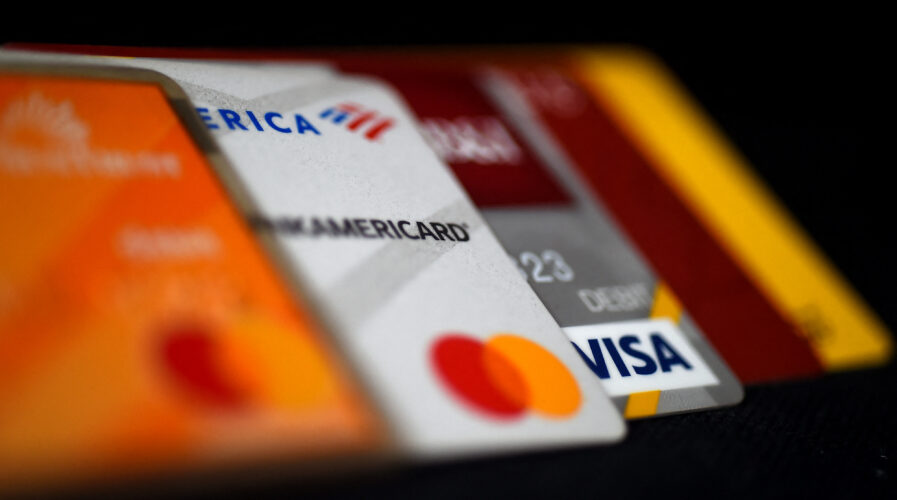
This illustration picture shows debit and credit cards arranged on a desk on April 6, 2020 in Arlington, Virginia – As restaurants risk dramatic drops in sales or outright closure amid the COVID-19 pandemic, some businesses are encouraging customers to pay with credit or debit card, while others are introducing no cash policies to limit the exchange of germs during transactions. (Photo by Olivier DOULIERY / AFP)
Banks in Asia are going green to reduce their carbon footprint
Organizations are banking on green initiatives to reduce their carbon footprints and provide more sustainable solutions. And one of the ways they can do this is by relying on technologies that not only enable them to measure their carbon emissions, but also provide them solutions on how they can reduce them.
The United Nation’s Paris Agreement, adopted in 2015, aims to strengthen the global response to the threat of climate change by keeping a global temperature rise this century well below 2 degrees Celsius above pre-industrial levels.
The agreement also aims to strengthen the ability of countries to deal with the impacts of climate change, through appropriate financial flows, a new technology framework, and an enhanced capacity-building framework.
While most industries like manufacturing, oil, and gas have already begun reducing their carbon emissions, the financial industry is also hoping to reduce its carbon footprint by going green. For the finance industry, going green means having solutions that are sustainable and reducing the use of physical products, especially packaging.
In Asia, several major banks have already launched green initiatives with tech companies in order to reduce their carbon emissions. Thales has been enabling banks and financial companies to enable their consumers to bank and transact safely while reducing their impact on the environment.
According to Micheal Au, Senior Vice President, Thales Banking and Payment Solutions, Asia, as the global financial sector looks for ways to bounce back post-pandemic, there is a greater emphasis on building back better and greener.
“As a pioneer in the industry, we’ve seen that our customers deeply value a holistic and comprehensive portfolio of sustainable banking products to make a positive contribution to society. In addition, contactless technology for transactions, mobility, and authentication are part of our daily lives.
Thales’ broad portfolio of solutions are helping the financial sector, not just in how they operate efficiently but also in how they’re perceived by their customers and the values that their company stands for,” said Michael.
Banking on green credit cards
One of the most convenient ways to reduce carbon footprints is to reduce the use of materials that are not biodegradable, such as plastic. While banks have reduced their paper usage, many still rely on plastic for their credit cards. To help reduce this, Thales has designed cards made of bio-sourced materials.
For example, Thales partnered with DBS Bank Taiwan to launch Asia’s first bio-sourced credit card in July 2020, with the intention of promoting customer awareness and the use of environmentally-friendly banking solutions. The card is made of polylactic acid, a bio-based biodegradable polymer that can be produced from renewable resources.
Thales has also partnered with UOB to make sustainable financial products accessible to all. As part of its commitment, UOB’s environmental, social, and governance (ESG) approach is embedded across its suite of financial solutions and services to make it simpler for customers to adopt a greener lifestyle. This includes offering green financing solutions for electric vehicles and eco-friendly homes as well as sustainable investment solutions.
This year, the bank launched Singapore’s first bio-sourced credit card for its sustainability-oriented Generation Z customers. The UOB EVOL Card is the Bank’s first card to use Polylactic Acid (PLA) and bio-sourced, corn-based materials which are safe for incineration.
Compared to traditional plastic credit cards which are typically made up of Polyvinyl Chloride (PVC), the UOB EVOL Card cuts down on plastic use by 82% and reduces UOB’s carbon footprint by 10 grams per card. UOB also plans to replace the rest of its plastic debit and credit cards with environmentally-friendly options in the future.
Over in Malaysia, Thales is also helping Standard Chartered offset the carbon footprint of their cards. For its consumer business, Standard Chartered aims to reduce its carbon footprint, when it launched its first CarbonNeutral credit card in Malaysia in November 2020.
Standard Chartered is rolling out the program on a global basis, targeting carbon neutrality for its credit and debit card issuance. Assuming the average bank card has a carbon footprint of about 150 CO2eq (carbon dioxide equivalent) or approximately five plastic bags, Standard Chartered’s annual issuance of 3 million cards translates to 15 million plastic bags.
Apart from using bio-sourced PLA cards, the Thales Reclaimed Ocean Plastic card is made using 70% discarded plastic waste cleared from coastal areas, with one card containing the equivalent of one reclaimed plastic PET bottle.
The Thales Recycled PVC card is made using post-manufacturing plastic waste from different industries, such as the packaging and printing sectors, containing 85% less plastic than first-use PVC.
As such, by combining the green offer with Thales’ technology in contactless banking solutions and cybersecurity, the financial industry has a wide portfolio of products and solutions to help its customers transact safely and deliver on their environmental commitments.
READ MORE
- Safer Automation: How Sophic and Firmus Succeeded in Malaysia with MDEC’s Support
- Privilege granted, not gained: Intelligent authorization for enhanced infrastructure productivity
- Low-Code produces the Proof-of-Possibilities
- New Wearables Enable Staff to Work Faster and Safer
- Experts weigh in on Oracle’s departure from adland


